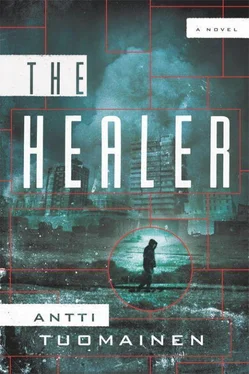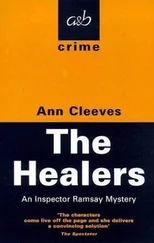Ahti shook his head.
“Tapani, you’re upset about Johanna’s disappearance. We completely understand.”
“I started thinking,” I continued, paying no attention to him. “Why did Ahti say that he hadn’t worked in two years, when I was easily able to find out that his last case was just last week?”
Ahti rubbed his forehead as if overcome by a sudden headache.
“You were one of the attorneys for A-Secure,” I said, “when they started to expand. They’re a pack of thieves, Ahti. They use violence. They rob people, beat people up, they may even kill people. But you work for them anyway.”
We were silent for a moment. I wondered where I was headed next. Ahti looked at Elina, and I saw a little smile on Elina’s face out of the corner of my eye—not a smile of amusement, but of love, attachment. She nodded. He nodded back.
“All right,” he said, or rather whispered, looking at me. “I don’t know if you’ve ever noticed, Tapani, but I’ve always been pretty quiet about the details of my work. I’ve had my reasons. And I’ve also had my reasons for working for the company you mentioned.”
I tried not to get worked up. I spoke as precisely and calmly as I could: “Johanna figured it out somehow. She found out that you had been working for companies like A-Secure for years. She got in touch with you about it. I found out a few hours ago when I read her e-mails. She got in touch with you, and then something happened. Something happened to Johanna, and to you. What happened that made you have to pack your bags and leave all of a sudden?”
Ahti was just about to open his mouth when Elina said, “We’re still your friends.”
I gave her a sideways glance. She continued: “What happened had nothing to do with whether we’re your friends or not. Johanna’s my best friend. We didn’t know everything would go to hell like this.”
“When you work for criminals, things have a habit of going to hell,” I said.
“Not like this,” Ahti said.
I stared at him. He stared back.
“For the last time,” I said. “What happened?”
They went through their nodding ritual again.
“Johanna called me,” Ahti said. “She told me about those murders—when and where they happened. Then she told me her theory, which seemed unbelievable to me at first. But I had been handling A-Secure contracts by the hundreds, and I remembered quite clearly where they had contracts with companies, and directly with tenants and homeowners’ associations. I didn’t need to go through very many files to realize that the murders were in the same areas, even the same homeowners’ associations. Then I looked at A-Secure’s contact registry to check the dates of the initial contacts and the final agreements.”
He shook his head and rubbed his forehead again, harder this time.
“It went neighborhood by neighborhood: First they sent a salesman through an area of the city, then the murders happened, and immediately after that, they would get a heap of contracts for surveillance, security guards, alarm systems, all kinds of services. They made a big pile of money very fast. Johanna figured it out.”
Ahti raised his eyes.
“I didn’t know what to do, who to tell about it, or what to tell them.”
“The police didn’t occur to you?”
He shook his head again.
“How would they have been able to protect us? How quickly could they investigate anything or link anything to A-Secure? And there was no way I was going to testify. I knew where it was in the company that these things were happening, and I had a good idea why.”
“Who did you tell about it?” I asked.
“Elina.”
“Nobody at A-Secure?”
He sighed.
“There’s one other thing.”
“What?” I asked.
“The contracts I was talking about, the ones that were signed right after each murder, were all written by the same person. The reason I wanted to get to Norway is because the person who wrote them was the head of the company himself. I’ve only seen him a couple of times in passing. You see, A-Secure is really just two men and a very effective ad campaign. Everything else is subcontracted.”
I had an idea that seemed like a long shot but worth a try. I asked, “When was A-Secure established?”
“About four and a half years ago,” Ahti said.
“Who set it up?”
“Harry Rosendahl and Max Väntinen.”
I dug my phone out of my pocket, found the picture I was looking for, and turned the display toward Ahti. He squinted, got up from his chair, took the phone in his hand, looked at the photo for a moment, and said, “He’s a lot younger here, but that’s him. Harry Rosendahl.”
He handed the phone back to me.
Pasi Tarkiainen still looked out at me with that infectious smile that always seemed to demand an answer.
The dusk of a soft July evening creeps into the apartment. The objects in the room and their shadows merge with the summer air, the soft sofa is bottomless in the darkening room. I hear Johanna’s steps on the wood floor of the kitchen, chopping fresh ginger for her tea, stirring it, adding something—honey perhaps—stirring it again. I can hear the delicate clink of the spoon on the thin lip of the wide-mouthed cup. I can almost even hear the cup lifted from the table, although that couldn’t actually make a sound.
Then Johanna is in the room sitting beside me, and I can smell her hair and the green tea flavored with fragrant ginger and dried orange peel.
“I could make some for you, too,” Johanna says, her voice as soft as the darkening evening.
“No, thanks,” I say.
She tastes her tea, sipping it carefully from her spoon. The cup steams in front of her face.
“So it’s just the two of us,” she says after a moment.
I wrap my arm around her.
“No parents,” she says. “No children.”
I look into her eyes. There’s not a trace of sadness in them. If anything, there’s belief in life, courage. She scoops up her tea one small spoonful at a time, her lips puckering as she empties each one.
“Did you watch the news?” she asks.
“Yes.”
“We’ve been there before. It was our first trip together.”
“It’s gone now.”
“A lot of things are gone.”
“That’s what I was thinking,” I say. “That there are so many things that are gone now.”
“That’s like fretting over the length of a meter.”
“No, it’s not.”
“Yes, it is.” She smiles, looking intently at her cup of tea, as if something had disappeared into it. “A meter’s a meter. There’s nothing you or anyone else can do about it.”
I laugh.
“All right,” I say. “A meter’s a meter. The earth is burning up. There’s nothing to be done.”
Johanna looks at me, not smiling anymore.
“And it’s just the two of us. What do you think about that?”
“I think about you,” I say. “I think, I’m with you.”
“Is that enough?” she asks, not looking at me.
“It’s enough,” I say. “But that’s the wrong way to put it. I’m happy with you. That’s what I wanted to say.”
She tastes the tea from her cup, her upper lip reaching half a centimeter over the rim. She slurps the hot tea into her mouth and swallows carefully, concentrating. We sit in silence.
“What do you think about all this news?” she asks.
“I’m not surprised,” I say. “It’s not like there haven’t been signs it was coming for a long time.”
A few motes of dust dance in the last rays of sunlight.
“How long have we been together?” she asks, her smile not far off.
“Don’t you know?”
She laughs.
“Silly,” she says. “I’m asking if you know.”
Читать дальше












